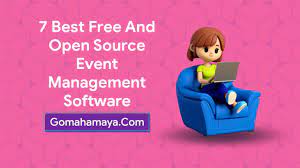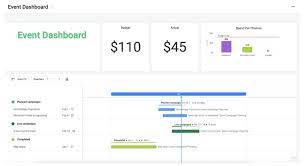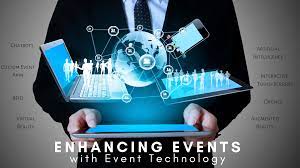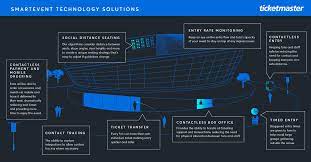Event Management Software: Streamlining Your Event Planning Process
In today’s fast-paced world, organizing successful events requires efficient management and coordination. From conferences and trade shows to weddings and music festivals, event planners face the challenge of juggling multiple tasks simultaneously. This is where event management software comes into play, revolutionizing the way events are planned, executed, and evaluated.
Event management software is a powerful tool that automates various aspects of event planning, allowing organizers to streamline their processes and save valuable time and resources. Let’s explore some key features and benefits of this technology.
- Centralized Data Management: One of the biggest advantages of event management software is its ability to centralize all event-related data in one place. From attendee registrations and ticketing information to vendor contracts and logistics details, everything can be easily accessed and managed through a user-friendly dashboard. This eliminates the need for manual data entry and reduces the risk of errors or miscommunication.
- Online Registrations: Traditional paper-based registration methods can be time-consuming for both organizers and attendees. Event management software simplifies this process by offering online registration capabilities. Attendees can register conveniently from any device, making it easier for them to secure their spots at your event. Organizers can collect attendee information efficiently, track registrations in real-time, and generate detailed reports effortlessly.
- Seamless Communication: Effective communication is crucial for successful event planning. Event management software provides various communication tools such as email marketing integrations, personalized notifications, and messaging systems to keep attendees informed about updates, schedules, or any last-minute changes. Additionally, it enables organizers to engage with attendees through surveys or feedback forms to gather valuable insights for future improvements.
- Streamlined Ticketing: Managing ticket sales manually can be a daunting task that often leads to confusion or errors in tracking sales data. With event management software’s integrated ticketing system, organizers can easily create customizable tickets with different pricing tiers, discounts, or promotional codes. The software also allows for secure online transactions, ensuring a smooth ticket purchasing experience for attendees.
- Efficient Resource Management: Planning an event involves coordinating various resources such as venues, equipment, and staff. Event management software simplifies this process by providing features like venue management, equipment tracking, and staff scheduling tools. This ensures that all necessary resources are allocated appropriately and eliminates the risk of double bookings or conflicts.
- Real-time Analytics and Reporting: Evaluating the success of an event is crucial for future planning and decision-making. Event management software offers real-time analytics and reporting capabilities, allowing organizers to track attendance rates, revenue generated, feedback received, and other key metrics. These insights help identify areas of improvement and make data-driven decisions for upcoming events.
In conclusion, event management software has become an indispensable tool for modern event planners. By automating various tasks and centralizing data management, it streamlines the entire event planning process from start to finish. Whether you’re organizing a small gathering or a large-scale conference, utilizing event management software can save time, enhance attendee experience, and ultimately contribute to the success of your event.
7 Essential Tips for Choosing the Right Event Management Software
- Research the different types of event management software available to determine which features will best meet your needs.
- Consider the cost of the software, as well as any additional fees for services such as customer support or training.
- Ensure that the software is compatible with your existing systems and processes, such as accounting and registration platforms.
- Check if there are any limitations on user access or data storage capacity in order to ensure you can store all relevant information securely and efficiently.
- Look for a system that offers automated features such as email reminders and notifications, ticketing systems, and payment processing capabilities to streamline your workflow process and save time & money.
- Make sure the system has strong security measures in place to protect sensitive data from malicious cyber attacks or unauthorized access attempts.
- Test out different event management software options before making a final decision to make sure it meets all of your organizational requirements & preferences effectively & efficiently!
Research the different types of event management software available to determine which features will best meet your needs.
When it comes to event management software, conducting thorough research is key to finding the right solution that meets your specific needs. With a wide range of options available in the market, taking the time to explore and understand the different types of event management software will ensure you make an informed decision.
Start by identifying your requirements and objectives. What are the key features and functionalities you need? Consider aspects such as attendee registration, ticketing, communication tools, resource management, analytics, and reporting. Each event management software may offer a unique combination of features, so it’s important to prioritize what matters most to you.
Next, delve into the various types of event management software available. Some solutions focus on specific event types like conferences or trade shows, while others cater to a broader range of events such as weddings or festivals. Understanding these distinctions will help narrow down your options and find software that aligns with your event’s specific requirements.
Take advantage of online resources such as review websites or industry forums to gather insights from other event planners who have used different software solutions. Their experiences and recommendations can provide valuable guidance in making an informed decision.
Additionally, consider factors like pricing models, customer support availability, and user-friendliness when evaluating different options. A well-rounded understanding of these aspects will ensure that the chosen software not only meets your current needs but also offers scalability for future events.
By thoroughly researching the available types of event management software and assessing their features against your requirements, you can confidently select a solution that streamlines your planning process and maximizes the success of your events. Remember that investing time upfront in research will save you time and effort in the long run by finding the perfect match for your unique needs.
Consider the cost of the software, as well as any additional fees for services such as customer support or training.
When exploring event management software options, it’s essential to consider not only the cost of the software itself but also any additional fees that may be associated with it. These additional fees can include services like customer support or training, and they can significantly impact your overall budget and experience with the software.
While cost is an important factor to consider, it’s equally crucial to assess the value you will receive from the software and its associated services. Here are a few reasons why considering these additional fees is vital:
- Customer Support: Event management software can be complex, especially if you’re new to using such tools. Having access to reliable customer support can make a significant difference in your experience. Whether you encounter technical issues or need assistance with certain features, prompt and helpful customer support can save you time and frustration.
- Training: Many event management software providers offer training sessions or resources to help users get acquainted with their platform. Investing in proper training ensures that you and your team can maximize the software’s potential right from the start. It enables you to take full advantage of all the features and functionalities available, making your event planning process more efficient.
- Scalability and Flexibility: As your event requirements evolve over time, you may need additional services or features from your event management software provider. Understanding the costs associated with scaling up or adding new functionalities is crucial for long-term planning. Consider whether there are any upgrade fees or if certain services require an extra charge.
When evaluating different event management software options, take the time to thoroughly review pricing structures and inquire about any additional fees upfront. This will allow you to make an informed decision based on your specific needs and budget constraints.
Remember, while cost is important, it should not be the sole determining factor when selecting event management software. Consider factors like functionality, ease of use, reliability, and customer reviews alongside any additional fees for services such as customer support or training. By doing so, you can ensure that you choose a software solution that not only fits your budget but also provides the necessary support and resources for a successful event planning experience.
When considering event management software for your organization, it’s essential to ensure compatibility with your existing systems and processes. Integrating new software seamlessly with your accounting and registration platforms can save time, reduce manual effort, and enhance overall efficiency.
By choosing software that integrates smoothly with your accounting system, you can streamline financial management tasks. This means easy synchronization of financial data such as invoices, payments, and budget tracking. With compatible software, you can generate accurate financial reports effortlessly, ensuring transparency and facilitating better decision-making.
Additionally, compatibility with your registration platform is crucial for a seamless attendee experience. When the event management software seamlessly integrates with your registration system, it simplifies the process for attendees to register and purchase tickets. Real-time syncing of attendee data between the two systems eliminates the need for manual data entry or duplicate efforts.
Moreover, compatibility ensures that information flows seamlessly across different platforms within your organization. It allows for efficient communication between teams responsible for finance, registration, marketing, and other event-related tasks. This integration minimizes errors or miscommunication that may arise from disconnected systems.
Before investing in event management software, thoroughly assess its compatibility with your existing systems. Consult with the software provider to understand their integration capabilities and ensure they align with your specific needs. Consider factors such as API availability (Application Programming Interface), data mapping options, and any additional costs associated with integration.
In conclusion, choosing event management software that is compatible with your existing systems and processes is vital for maximizing efficiency in event planning. Seamless integration between accounting and registration platforms allows for streamlined financial management and a smoother attendee experience. Take the time to evaluate compatibility during the selection process to ensure a successful implementation of the software within your organization.
When considering event management software for your next event, it’s important to take into account the limitations on user access and data storage capacity. These factors play a crucial role in ensuring that you can store all relevant information securely and efficiently.
User access limitations refer to the number of users who can access the software simultaneously. Depending on the size and complexity of your event, you may have multiple team members or stakeholders who need access to the software. It’s essential to check if there are any restrictions on the number of users allowed, as exceeding this limit could hinder collaboration and create unnecessary bottlenecks.
Equally important is evaluating the data storage capacity provided by the software. Events generate vast amounts of data, including attendee information, registration details, vendor contracts, and more. Having sufficient storage space ensures that you can store all this information without running into capacity issues. It also allows for future scalability if you plan to organize larger events in the future.
By considering these limitations upfront, you can avoid potential headaches down the line. Ensure that the event management software you choose offers adequate user access and data storage capacity for your specific needs. This will enable you to manage your event smoothly while keeping all relevant information secure and easily accessible.
Remember, thorough research and understanding of these limitations will contribute to a seamless event planning experience with your chosen event management software.
Look for a system that offers automated features such as email reminders and notifications, ticketing systems, and payment processing capabilities to streamline your workflow process and save time & money.
Streamline Your Event Planning with Automated Features in Event Management Software
Planning an event involves numerous tasks, and as an event organizer, you understand the importance of efficiency and saving time. This is where event management software comes to the rescue. When choosing the right software for your needs, it’s essential to consider automated features that can simplify your workflow and help you save both time and money.
One key feature to look for in event management software is automated email reminders and notifications. Sending manual reminders and updates to attendees can be time-consuming and prone to errors. With automated email features, you can schedule reminders for important dates, send updates about schedule changes or speaker announcements, and ensure that attendees stay informed every step of the way. This not only saves you precious time but also enhances communication with your audience.
Another valuable feature is a built-in ticketing system. Managing ticket sales manually can be overwhelming, especially when dealing with different pricing tiers or promotional codes. An event management software with a ticketing system allows you to create customizable tickets, set pricing options, and track sales in real-time. Attendees can conveniently purchase tickets online, eliminating the need for manual handling of payments or physical tickets. This automation simplifies the entire ticketing process for both organizers and attendees.
Additionally, payment processing capabilities within the software can further streamline your workflow. Instead of dealing with separate payment gateways or offline transactions, an integrated payment processing system enables secure online transactions directly through your event management software. This not only saves time but also ensures a seamless experience for attendees when purchasing tickets or making payments for additional services.
By choosing event management software that offers these automated features, you empower yourself to focus on other crucial aspects of event planning while reducing manual tasks and potential errors. The time saved can be redirected towards enhancing attendee experiences or fine-tuning other aspects of your event.
In conclusion, when selecting an event management software solution, prioritize systems that offer automated features such as email reminders and notifications, ticketing systems, and payment processing capabilities. These features will streamline your workflow process, save you time and money, and ultimately contribute to the success of your event. Embrace automation and enjoy a more efficient event planning experience!
Make sure the system has strong security measures in place to protect sensitive data from malicious cyber attacks or unauthorized access attempts.
When it comes to event management software, one crucial aspect that should never be overlooked is security. With the increasing prevalence of cyber attacks and data breaches, protecting sensitive information has become a top priority for businesses and individuals alike.
When selecting an event management software system, it is essential to ensure that it has robust security measures in place. Here are some key considerations:
- Data Encryption: Look for a system that utilizes strong encryption protocols to safeguard your data. This ensures that any sensitive information, such as attendee details or financial transactions, is encrypted and protected from unauthorized access.
- Secure Access Controls: The software should provide secure access controls, allowing you to define user roles and permissions. This ensures that only authorized personnel can access certain features or sensitive data within the system.
- Regular Updates and Patches: Choose a software provider that actively maintains and updates their system to address any security vulnerabilities promptly. Regular patches and updates help protect against emerging threats and ensure that your data remains secure.
- Compliance with Data Protection Regulations: Verify that the event management software complies with relevant data protection regulations, such as the General Data Protection Regulation (GDPR) or the California Consumer Privacy Act (CCPA). This demonstrates the provider’s commitment to protecting your data privacy rights.
- Secure Payment Processing: If your event involves online ticket sales or payment processing, ensure that the software integrates with trusted payment gateways and follows industry-standard security practices for secure transactions.
- Backup and Disaster Recovery: A reliable event management software system should have robust backup procedures in place to safeguard your data in case of any unforeseen events or system failures.
By prioritizing security when choosing an event management software system, you can have peace of mind knowing that your sensitive data is well-protected against cyber threats or unauthorized access attempts. Remember, investing in a secure platform not only protects your attendees’ information but also safeguards your reputation as a responsible event organizer.
Test out different event management software options before making a final decision to make sure it meets all of your organizational requirements & preferences effectively & efficiently!
Finding the perfect event management software for your organization is crucial for successful event planning. With so many options available in the market, it’s important to thoroughly test out different software before making a final decision. This ensures that the chosen software meets all your organizational requirements and preferences effectively and efficiently.
Testing out various event management software options allows you to explore their features, user interface, and compatibility with your existing systems. Here are a few reasons why this step is essential:
- Assessing Functionality: Each event management software comes with its own set of features and capabilities. By testing multiple options, you can compare functionalities such as online registration, ticketing, communication tools, reporting capabilities, and more. This helps you identify which software aligns best with your specific needs.
- User Experience: The user experience plays a significant role in the efficiency of event planning. By trying out different software interfaces, you can evaluate their ease of use and intuitiveness. Consider how easily you can navigate through the platform, access important information, and perform necessary tasks. A user-friendly interface will save time and reduce the learning curve for you and your team.
- Integration Possibilities: Event management software often needs to integrate with other tools or platforms used by your organization such as CRM systems or marketing automation tools. Testing different options allows you to check if they provide seamless integration with your preferred applications or if additional customization is required.
- Customization Options: Every organization has unique requirements when it comes to event management processes. Testing various software solutions enables you to assess their customization options. Look for flexibility in branding, registration forms, ticket layouts, email templates, and other elements that align with your organization’s branding guidelines.
- Support and Training: Adequate support and training are essential when adopting new technology. During the testing phase, reach out to the customer support teams of different software providers to evaluate their responsiveness and helpfulness in addressing any queries or issues that may arise. Additionally, consider the availability of training resources such as tutorials, documentation, or webinars.
By thoroughly testing different event management software options, you can make an informed decision that best suits your organization’s unique needs. This ensures that the software you choose will effectively and efficiently support your event planning process, leading to successful and memorable events.






